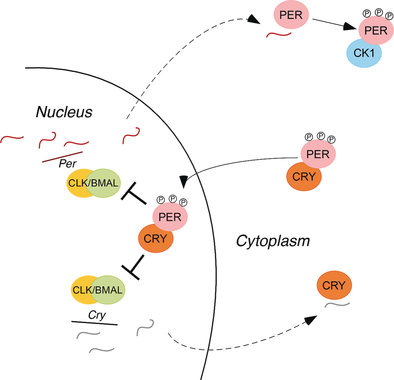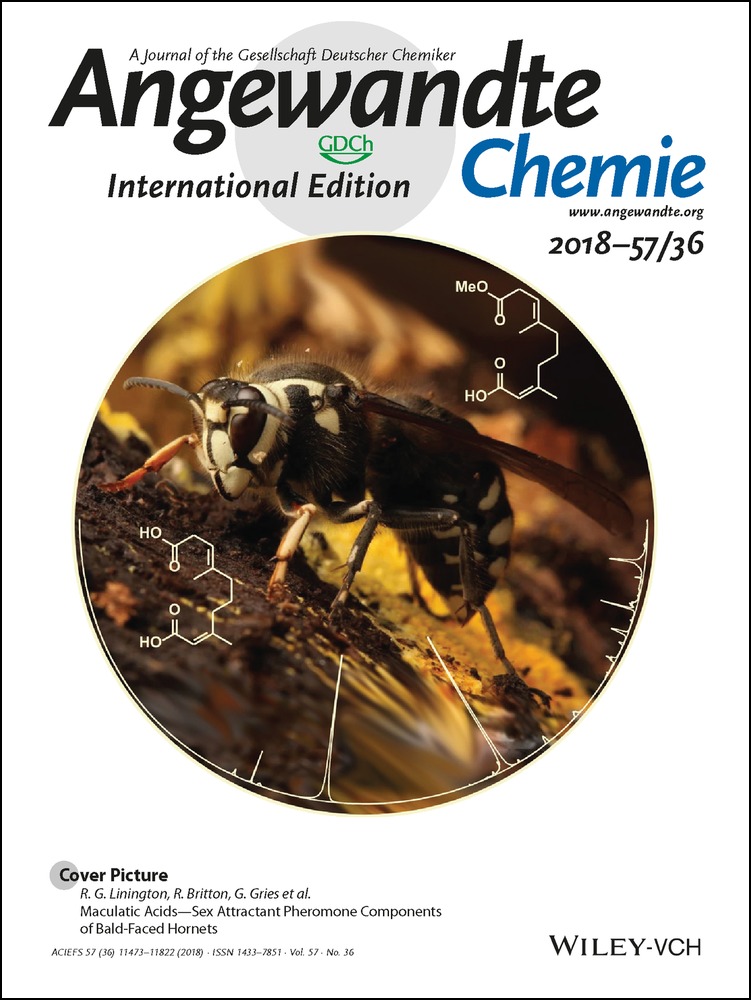Review
Time Travels: A 40-Year Journey from Drosophila's Clock Mutants to Human Circadian Disorders (Nobel Lecture)†
Prof. Michael W. Young,
Corresponding Author
Prof. Michael W. Young
Laboratory of Genetics, The Rockefeller University, 1230 York Avenue, New York, NY, 10065 USA
Search for more papers by this authorProf. Michael W. Young,
Corresponding Author
Prof. Michael W. Young
Laboratory of Genetics, The Rockefeller University, 1230 York Avenue, New York, NY, 10065 USA
Search for more papers by this author†
Copyright© The Nobel Foundation 2017. We thank the Nobel Foundation, Stockholm, for permission to print this lecture.
Graphical Abstract
References
- 1“Phase control of activity in a rodent”: P. J. DeCoursey, Cold Spring Harbor Symp. Quant. Biol. 1960, 25, 49–55.
- 2“Circadian regulation of gene expression systems in the Drosophila head”: A. Claridge-Chang, H. Wijnen, F. Naef, C. Boothroyd, N. Rajewsky, M. W. Young, Neuron 2001, 32, 657–671.
- 3“Clock mutants of Drosophila melanogaster”: R. J. Konopka, S. Benzer, Proc. Natl. Acad. Sci. USA 1971, 68, 2112–2116.
- 4“Transcriptional architecture of the mammalian circadian clock”: J. S. Takahashi, Nat. Rev. Genet. 2017, 18, 164–179.
- 5“double-time is a novel Drosophila clock gene that regulates PERIOD protein accumulation”: J. L. Price, J. Blau, A. Rothenfluh, M. Abodeely, B. Kloss, M. W. Young, Cell 1998, 94, 83–95.
- 6
- 6a“The Drosophila clock gene double-time encodes a protein closely related to human casein kinase Iepsilon”: B. Kloss, J. L. Price, L. Saez, J. Blau, A. Rothenfluh, C. S. Wesley, M. W. Young, Cell 1998, 94, 97–107;
- 6b“Phosphorylation of period is influenced by cycling physical associations of double-time, period, and timeless in the Drosophila clock”: B. Kloss, A. Rothenfluh, M. W. Young, L. Saez, Neuron 2001, 699–706.
- 7“Drosophila TIM binds importin α1, and acts as an adapter to transport PER to the nucleus”: A. R. Jang, K. Moravcevic, L. Saez, M. W. Young, A. Sehgal, PLoS Genet. 2015, 11, e 1004974.
- 8“Speed control: cogs and gears that drive the circadian clock”: X. Zheng, A. Sehgal, Trends Neurosci. 2012, 35, 574–585.
- 9“Interactive features of proteins composing eukaryotic circadian clocks”: B. R. Crane, M. W. Young, Annu. Rev. Biochem. 2014, 83, 191–219.
- 10“Regulation of the Drosophila protein timeless suggests a mechanism for resetting the circadian clock by light”: M. Hunter-Ensor, A. Ousley, A. Sehgal, Cell 1996, 84, 677–685.
- 11“Light-induced degradation of TIMELESS and entrainment of the Drosophila circadian clock”: M. P. Myers, K. Wager-Smith, A. Rothenfluh-Hilfiker, M. W. Young, Science 1996, 271, 1736–1740.
- 12“Independent photoreceptive circadian clocks throughout Drosophila”: J. D. Plautz, M. Kaneko, J. C. Hall, S. A. Kay, Science 1997, 278, 1632–1635.
- 13“Circadian clock in Malpighian tubules”: J. M. Giebultowicz, D. M. Hege, Nature 1997, 386, 664.
- 14“Entrainment of the circadian clock in the liver by feeding”: K. A. Stokkan, S. Yamazaki, H. Tei, Y. Sakaki, M. Menaker, Science 2001, 291, 490–493.
- 15“Restricted feeding uncouples circadian oscillators in peripheral tissues from the central pacemaker in the suprachiasmatic nucleus”: F. Damiola, N. Le Minh, N. Preitner, B. Kornmann, F. Fleury-Olela, U. Schibler, Genes Dev. 2000, 14, 2950–2961.
- 16“Resetting central and peripheral circadian oscillators in transgenic rats”: S. Yamazaki, R. Numano, M. Abe, A. Hida, R. Takahashi, M. Ueda, G. D. Block, Y. Sakaki, M. Menaker, H. Tei, Science 2000, 288, 682–685.
- 17“Circadian rhythm abnormalities”: P. C. Zee, H. Attarian, A. Videnovic, Continuum (Minneap Minn). 2013, 19, 132–147.
- 18“A Cryptochrome 2 mutation yields advanced sleep phase in humans”: A. Hirano, G. Shi, C. R. Jones, A. Lipzen, L. A. Pennacchio, Y. Xu, W. C. Hallows, T. McMahon, M. Yamazaki, L. J. Ptáček, Y. H. Fu, Elife 2016, 5, e 16695.
- 19“An hPer2 phosphorylation site mutation in familial advanced sleep phase syndrome”: K. L. Toh, C. R. Jones, Y. He, E. J. Eide, W. A. Hinz, D. M. Virshup, L. J. Ptácek, Y. H. Fu, Science 2001, 291, 1040–1043.
- 20“Functional consequences of a CKIdelta mutation causing familial advanced sleep phase syndrome”: Y. Xu, Q. S. Padiath, R. E. Shapiro, C. R. Jones, S. C. Wu, N. Saigoh, K. Saigoh, L. J. Ptácek, Y. H. Fu, Nature 2005, 434, 640–644.
- 21“Modeling of a human circadian mutation yields insights into clock regulation by PER2”: Y. Xu, K. L. Toh, C. R. Jones, J. Y. Shin, Y. H. Fu, L. J. Ptácek, Cell 2007, 128, 59–70.
- 22“Mutation of the Human Circadian Clock Gene CRY1 in Familial Delayed Sleep Phase Disorder”: A. Patke, P. J. Murphy, O. E. Onat, A. C. Krieger, T. Özçelik, S. S. Campbell, M. W. Young, Cell 2017, 169, 203–215.
- 23“Life between clocks: daily temporal patterns of human chronotypes”: T. Roenneberg, A. Wirz-Justice, M. Merrow, J. Biol. Rhythms 2003, 18, 80–90.
- 24“Molecular genetics of a biological clock in Drosophila”: T. A. Bargiello, M. W. Young, Proc. Natl. Acad. Sci. USA 1984, 81, 2142–2146.
- 25“Restoration of circadian behavioural rhythms by gene transfer in Drosophila”: T. A. Bargiello, F. R. Jackson, M. W. Young, Nature 1984, 312, 752–754.
- 26“Product of per locus of Drosophila shares homology with proteoglycans”: F. R. Jackson, T. A. Bargiello, S. H. Yun, M. W. Young, Nature 1986, 320, 185–188.
- 27“Changes in abundance or structure of the per gene product can alter periodicity of the Drosophila clock”: M. K. Baylies, T. A. Bargiello, F. R. Jackson, M. W. Young, Nature 1987, 326, 390–392.
- 28“Loss of circadian behavioral rhythms and per RNA oscillations in the Drosophila mutant timeless”: A. Sehgal, J. L. Price, B. Man, M. W. Young, Science 1994, 263, 1603–1606.
- 29“Rhythmic expression of timeless: a basis for promoting circadian cycles in period gene autoregulation”: A. Sehgal, A. Rothenfluh-Hilfiker, M. Hunter-Ensor, Y. Chen, M. P. Myers, M. W. Young, Science 1995, 270, 808–810.
- 30“Block in nuclear localization of period protein by a second clock mutation, timeless”: L. B. Vosshall, J. L. Price, A. Sehgal, L. Saez, M. W. Young, Science 1994, 263, 1606–1609.
- 31“Positional cloning and sequence analysis of the Drosophila clock gene, timeless”: M. P. Myers, K. Wager-Smith, C. S. Wesley, M. W. Young, A. Sehgal, Science 1995, 270, 805–808.
- 32“Control of daily transcript oscillations in Drosophila by light and the circadian clock”: H. Wijnen, F. Naef, C. Boothroyd, A. Claridge-Chang, M. W. Young, PLoS Genet. 2006, 2, e 39.
- 33“A role for the segment polarity gene shaggy/GSK-3 in the Drosophila circadian clock”: S. Martinek, S. Inonog, A. S. Manoukian, M. W. Young, Cell 2001, 105, 769–779.
- 34“Control of sleep by cyclin A and its regulator”: D. Rogulja, M. W. Young, Science 2012, 335, 1617–1621.
- 35“insomniac and Cullin-3 regulate sleep and wakefulness in Drosophila”: N. Stavropoulos, M. W. Young, Neuron 2011, 72, 964–976.





